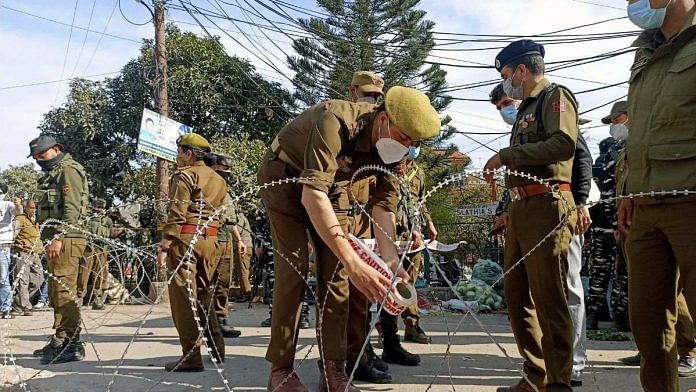
Thank you dear subscribers, we are overwhelmed with your response.
Your Turn is a unique section from ThePrint featuring points of view from its subscribers. If you are a subscriber, have a point of view, please send it to us. If not, do subscribe here: https://theprint.in/subscribe/
This is in reference to an encouraging report by Snehesh Alex Philip, “Kashmir sees ‘drastic fall’ in terror recruitment after Army & police launch de-radicalisation drive” dated 02 June, in The Print. The report brought out as to how the de-radicalisation being undertaken in the Kashmir Valley has shown positive results with terror recruitments drastically coming down. General Officer Commanding (GOC) Srinagar Corps, on 04 June stated that Pakistan was using a mix of social media, local influencers and narcotics to radicalise the Kashmir youth but Army had launched various people-friendly initiatives to counter the propaganda of the inimical elements. It is hoped that the crucial de-radicalisation drive sustains and widens its canvas to be more effective. Also, in addition to Kashmir valley, the focus is warranted on the Jammu region too, in view of the re-surfacing of this area as a hotbed of terror activities.
Radicalisation should be approached as a psycho-social process of gradual progress from context, to thought, and finally to action. Hence, it requires micro (at individual level) and macro (at societal level) examination of context-specific variables to explain causation. The State alone does not have all the resources necessary to carry out de- radicalisation. The Government needs partners to carry out this task and involving civil society and local communities is key to a range of tools and resources not available to Governments.
The Government needs to plan on persuasive tactics as against the traditional strong-arm tactics since there has been a growing consensus, and rightly so, that extreme measures should be taken only in exceptional cases. A de-radicalisation strategy has to be all encompassing, to go much beyond the realms of security and law & order. Response will have to operate at several levels – individual, family, community, education, media, government and security forces.
At the individual level youth will have to be constantly guided to stay on the correct path by providing alternate channels for airing grievances as well as managing concerns, be it of education or employment. The role of the family is important, where influence could be used to cajole the subject to dis-associate and if necessary return to the desired path. Mothers, sisters and wives have a major role to play to keep male members in the family away from the path of extremism and violence. At the level involving community leaders, the role of Ulema, heads of seminaries and clerics is crucial. In India there are a number of Muslim clergy who have condemned violence by terrorist groups unequivocally. Repeating their message is necessary and media can play a crucial role in reinforcing rhetoric based on credibility. Media sensitisation for the envisioned goal need to be initiated by the State which in turn should exhort the corporate world as well, to take the ownership as redefined ‘Corporate Social Responsibility’.
Continuously expanding reach of social media has played an extremely crucial role towards revolutionising the manner in which ideas and opinions spread; a facet that was recently highlighted by the GOC. In recent few months, we have seen People’s Anti-Fascist Front, actively engaging in manufacturing narratives on social media, vis-a-vis the terror strikes that they claimed responsibility for, in Rajouri and Poonch region. Towards keeping a tab on social media, in addition to the tasks rendered by defence agencies, organisations like National Technical Research Organisation (NTRO) should be geared up to take on the effort, including recruiting, training and capacity building.
The Government will have to provide direction in the form of a national strategy, policy or guidelines for countering radicalisation. Pluralism should be encouraged as core essence of ‘idea of India’ and leaders should avoid falling prey to indiscretions. Security forces should avoid getting discriminatory by targeting youth of a particular community merely on the basis of information or hearsay. One misplaced arrest can lead to adverse reaction in the community at large and should be avoided. Intelligence will remain a key tool to focus on actual offender while avoiding targeting innocents.
There is a gigantic task ahead in which the society and the Government will have to move ahead in tandem, with the ‘root cause’ philosophy providing the terms of reference. An effort to counter radicalisation has to be nothing less than a focused national campaign comprising multi-pronged approach. We have been suffering insurgencies for last six decades; underlying the fact that radicalisation has existed, all along. Given our not so encouraging track record in formalising national strategies related to field of security, media and intelligentsia shall have to keep the issue alive, so as to push the envelope for needful, fuelling our democratic pillars i.e. legislative, judiciary and executive, to act.
Colonel Shashank Ranjan is a retired Infantry officer with rich experience of counter insurgency. He is currently an Adjunct Professor with OP Jindal Global University.
These pieces are being published as they have been received – they have not been edited/fact-checked by ThePrint.

COMMENTS